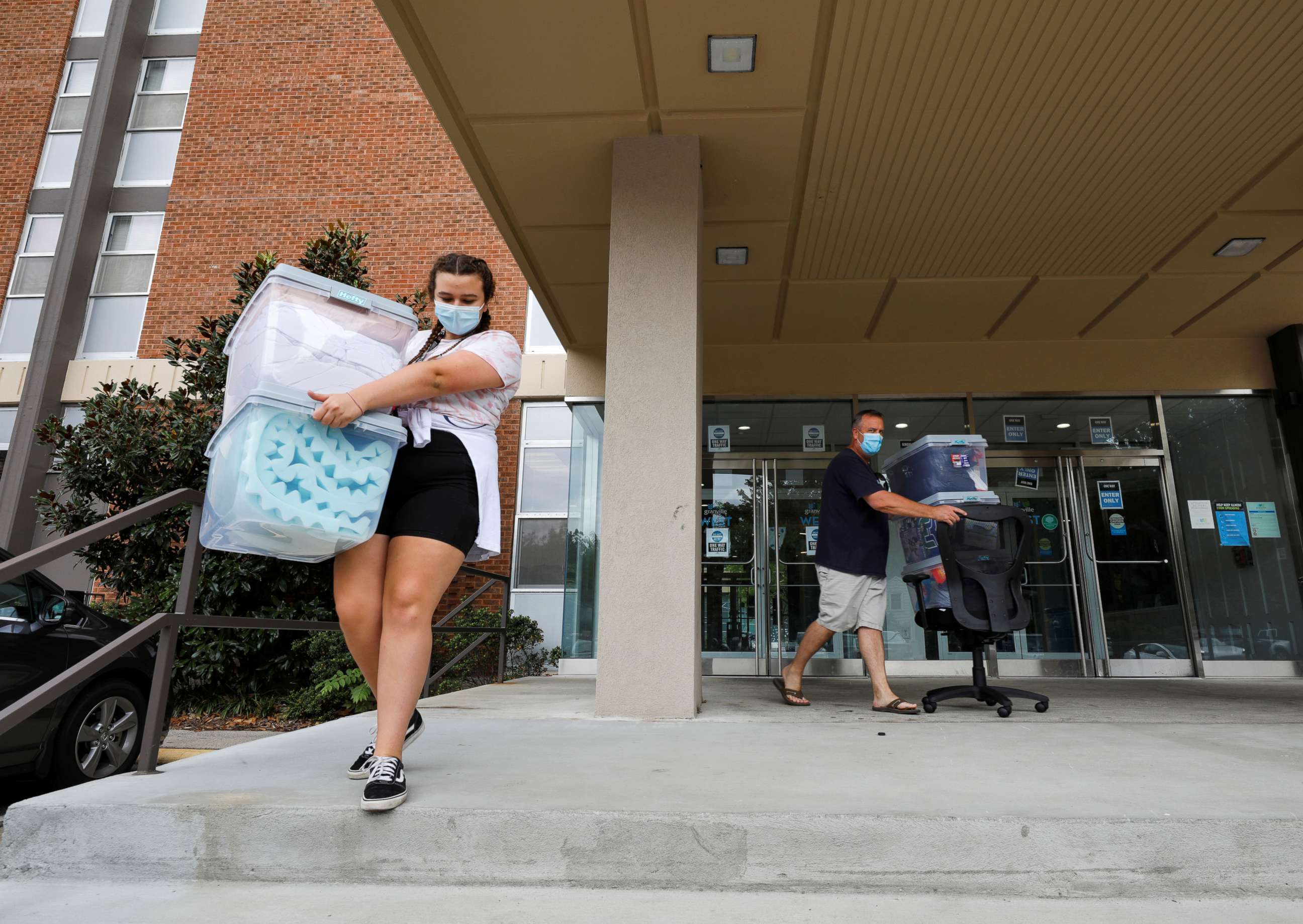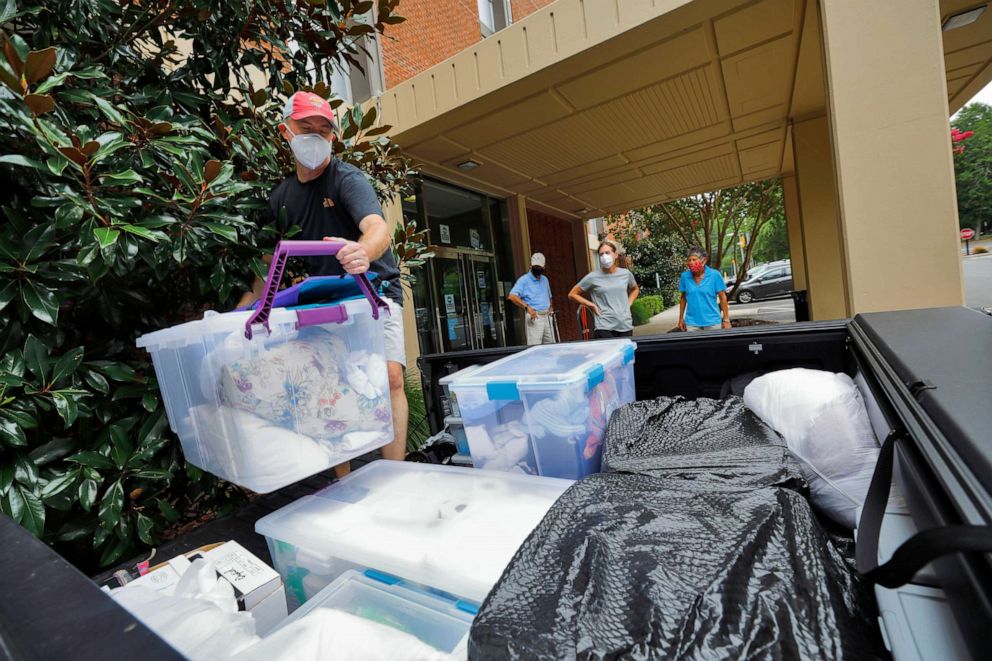Colleges ask students to leave campus amid COVID-19 outbreaks, but experts advise the opposite
It's "the worst thing you can do," said Dr. Anthony Fauci.
As colleges deal with COVID-19 outbreaks, some are having their students leave campus -- which medical authorities warn is the opposite of what they should be doing.
White House coronavirus response coordinator Dr. Deborah Birx over the weekend advised against residential students -- infected with COVID-19 -- isolating off campus.
"Please isolate at your college," Birx said at a news conference. "Do not return home if you're positive and spread the virus to your family, your aunts, your uncles, your grandparents."
Birx repeated her warning in a weekly White House call with governors on Tuesday.
"It's really important that you check in with your university presidents to make sure they also have an isolation and care plan for students who become positive, even if they have moved to online," Birx said in audio obtained by ABC News.
"It's really important that these students are continuously tested, isolated and cared for and don't return to their multi-generational households where they could dramatically increase spread, particularly over the Labor Day weekend," she continued.
Dr. Anthony Fauci, the nation's top infectious disease expert, also weighed in this week. On NBC's "Today" show Wednesday morning, he didn't mince words when he said sending students home after an outbreak is the "worst thing you could do."
"Keep them at the university in a place that's sequestered enough from the other students, but don't have them go home because they could be spreading it in their home state," he said.

In communications with students, though, some schools are recommending that students go home to isolate or quarantine.
In materials sent to students who are required to quarantine for 14 days, the University of Mississippi encouraged students "to consult with your family to consider your options for quarantine, including returning to your family residence." It also advised students that options for isolation "involve temporary relocation to your family home or a designated isolation space on campus."
"We know that returning home is not advisable for some students if they have a relative who is in a vulnerable group, while others prefer to go home if their situation allows for it," university spokesman Rod Guajardo told ABC News.
The University of Mississippi has had nearly 350 confirmed cases of COVID-19 among students and employees on its Oxford campus since mid-August, when students began to move into the dorms. Currently, there are 295 active cases -- all but nine among students -- and 16 active outbreaks are in campus housing, according to data posted on the school's website. Only 29 students with confirmed cases of COVID-19 are currently in designated isolation spaces.
Some schools have pivoted to virtual learning amid rising cases on campus. Last month, the University of North Carolina at Chapel Hill ended in-person undergraduate classes after reporting 130 new cases in students in a week. To further help de-densify the campus, undergraduate students living in campus housing could change their residential plans with no penalty.
This week, James Madison University in Harrisonburg, Virginia, became one of the latest schools to go virtual. President Jonathan Alger announced on Tuesday that learning will be primarily online through at least the end of the month due to a "rapid increase in the number of positive cases." Since classes started on Aug. 24, JMU has had more than 600 confirmed cases, with a positivity rate of almost 17%, according to data on the school's website. The school will consider a potential return to in-person learning as early as Oct. 5, later this month.

Students were asked to return home by Sept. 7, "in an effort to reduce the number of people on campus," Alger said. Caitlyn Read, a university spokesperson, told ABC News the university is not sending students home who have COVID-19 and are in isolation, or those who have been in contact with a confirmed case and are quarantining, until they finish their prescribed time.
"We are also recommending that all students quarantine for 14 days when they return home to help reduce the likelihood of viral spread to new communities," Read said.
JMU students have been encouraged to isolate or quarantine off campus. On its website, the school stated that "students that live both on and off campus are being asked to return home, to their families, if possible to isolate and/or quarantine." The school currently has 601 active COVID-19 cases, with 89 students in isolation or quarantine beds on campus.
Space may be at a premium for schools isolating or quarantining students. One reason for going remote, Alger said, is the worry that space may run out. With 143 isolation and quarantine beds total, there were 54 available as of Wednesday. In addition to monitoring health trends over the next four weeks, the university will be looking into acquiring additional capacity should they need it in the future, Read said.
The University of Mississippi also is exploring acquiring more space for isolating and quarantining students, including local hotels and apartment complexes off campus. Its current isolation capacity is at nearly 75%.
"The numbers are fluctuating up and down every day, so our goal is to track and analyze the data available to us and then make decisions to help our students however we can," Guajardo said.
The difficulties that come with isolating and quarantining students -- especially those from states on New York's quarantine travel list -- led to Columbia University's decision to go virtual this fall.
In a letter to students last month, President Lee C. Bollinger noted that "while I have no doubt that we could ensure a safe quarantine period from a public health standpoint, two weeks is a long time to endure isolation, especially for students who will be leaving home for the first time."
"Conditions for all students in quarantine will be austere, to say the least," he added.
ABC News' Dee Carden, Brian Hartman and Katherine Faulders contributed to this report.




